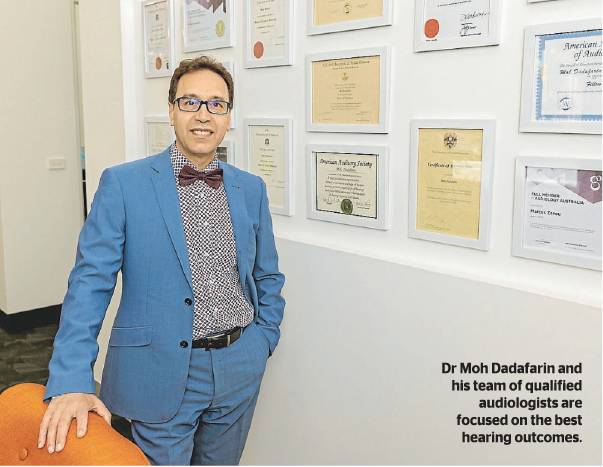It’s time to hear what everyone has to offer
Those who suffer from hearing loss feel the strain in most aspects of their lives.
Hearing loss is more prevalent than asthma, heart disease, cancer and diabetes. An estimated one in six Australians suffers from hearing loss and by 2050 this is expected to increase to one in four.
Dr Moh Dadafarin, the director and principal audiologist of Ear & Hearing Australia, says hearing loss results in communication difficulties which can affect relationships, careers and quality of life.
“When you have hearing loss, being in noisy environments such as restaurants and family gatherings can be difficult,” he says. “You have to concentrate very hard to keep up with a conversation, which can be exhausting.”
Dr Dadafarin says hearing loss can affect a person’s work in several ways.
“Hearing is fundamental to work meetings, client phone calls and interactions with colleagues. It’s frustrating for your workmates if they have to repeat themselves all the time,” he says.
“People may perceive your behaviour as rude and exclude you from conversations. Without realising it, your hearing loss can affect your life in major ways.” If not treated hearing loss may lead to physiological problems including memory and cognitive decline, and auditory deprivation, a condition whereby the brain may lose the ability to interpret words.
“Most people start to avoid social situations altogether, which can lead to isolation and depression,’’ says Dr Dadafarin.
Hearing aids have improved patients’ relationships, social lives and physical and mental health, he says.
“People who use hearing aids generally report noticeable improvements to their wellbeing and quality of life.”
After treatment, Dr Dadafarin reports patients have found they can better engage in conversation with family and friends, watch television at a normal volume and speak with people by phone with ease. Though these are activities most people may take for granted, people who suffer from hearing loss often miss out on such everyday experiences.
Dr Dadafarin says his patients feel more independent and self-confident after treatment, notice a difference in their relationships with family and friends, and may have greater engagement in the workplace.
“You feel confident to be part of the conversation again and actively participate in life.’’
Significant breakthroughs in the development of hearing aids includes smaller and sometimes ‘invisible’ models.
“Modern hearing aids are very advanced and perform significantly better than older hearing aid models in noisy situations,” he says.
“They’re more discreet. Most are rechargeable and they can connect to your electronic devices such as smartphones and smart TVs. Some can be inserted into your ears and stay for months at a time, even while showering, exercising and sleeping.”
Ear & Hearing Australia was founded in 1998 and is one of the largest independent hearing practices in Australia, with 14 clinics across Melbourne.
Its team of audiologists are masters and doctorate degree-trained in audiology and have helped patients for many years.
“We are a patient-centred practice,” Dr Dadafarin says. “Our focus is on providing the best outcomes. We are independent and not affiliated with any one manufacturer.
‘‘Our audiologists receive no commissions, bonuses or other financial incentives, so we provide unbiased advice.
“We understand the difficulties our clients face in everyday situations and we’re passionate about helping them break down those barriers to social participation and getting back to leading a full and happy life.”
‘People who use hearing aids report noticeable improvements to their wellbeing.’
-Dr Moh Dadafarin
